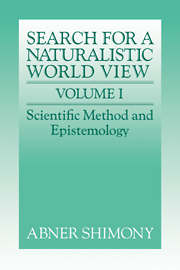Book contents
- Frontmatter
- Contents
- Acknowledgments
- A THE DIALECTIC OF SUBJECT AND OBJECT
- B PERCEPTION AND CONCEPTION
- C EPISTEMIC PROBABILITY
- 6 Coherence and the axioms of confirmation
- 7 An Adamite derivation of the principles of the calculus of probability
- 8 The status of the Principle of Maximum Entropy
- D INDUCTIVE INFERENCE: THE DIALECTIC OF EXPERIENCE AND REASON
- E FACT AND VALUE
- Index
8 - The status of the Principle of Maximum Entropy
Published online by Cambridge University Press: 21 December 2009
- Frontmatter
- Contents
- Acknowledgments
- A THE DIALECTIC OF SUBJECT AND OBJECT
- B PERCEPTION AND CONCEPTION
- C EPISTEMIC PROBABILITY
- 6 Coherence and the axioms of confirmation
- 7 An Adamite derivation of the principles of the calculus of probability
- 8 The status of the Principle of Maximum Entropy
- D INDUCTIVE INFERENCE: THE DIALECTIC OF EXPERIENCE AND REASON
- E FACT AND VALUE
- Index
Summary
The Principle of Maximum Entropy (hereafter referred to as “PME”) was proposed by E. T. Jaynes [1957, 1963, 1967, 1968, 1976, 1979] as a fundamental instrument of inductive inference. Jaynes's ideas have been enthusiastically accepted and applied by numerous scientists, engineers, and philosophers, but there have also been critics and skeptics. Because of several papers over the past decade [Friedman and Shimony 1971; Friedman 1973; Shimony 1973; Dias and Shimony 1981] my collaborators and I are considered to belong to the second group. Our effort, however, has not been entirely negative. We have attempted to discover tacit presuppositions of PME and thereby to determine the circumstances under which it may legitimately be applied. The present paper is a summary of our results, with only a sketch of some of the mathematical arguments.
We share with Jaynes the conviction that an epistemic concept of probability plays a central role in inductive inference. If h is a hypothesis and d is an evidential proposition (not self-contradictory), then we suppose that it is meaningful to speak of “the probability of h upon assumption that d is the total body of evidence” and to consider this probability to be a definite real number denoted by “P(h | d)”. The statement “P(h | d) = r” is to be interpreted as “the reasonable degree of belief in h, if d is the total evidence, is r”.
- Type
- Chapter
- Information
- The Search for a Naturalistic World View , pp. 162 - 180Publisher: Cambridge University PressPrint publication year: 1993



